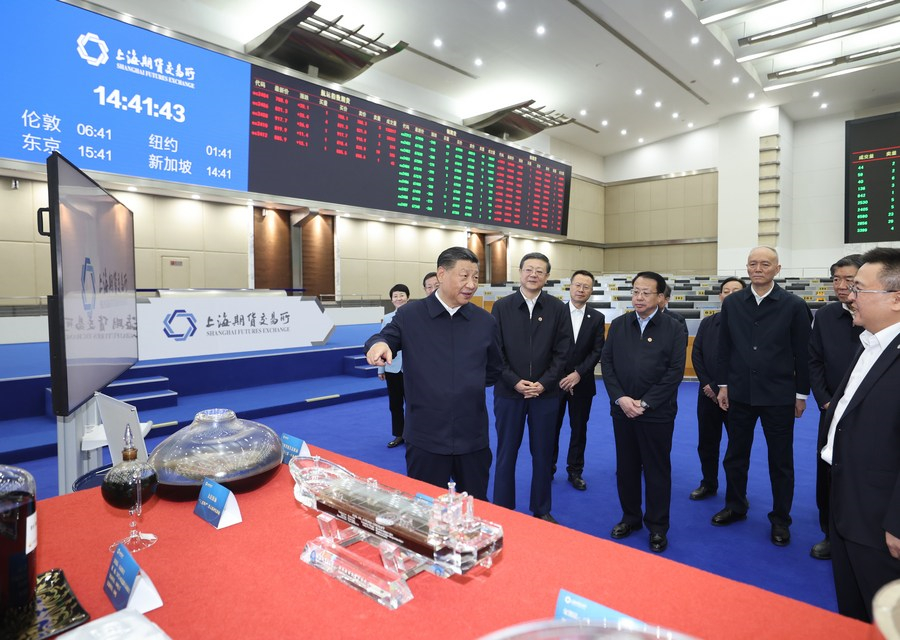Xi's Shanghai inspection tour sends signal of high-quality development

Chinese President Xi Jinping, also general secretary of the Communist Party of China (CPC) Central Committee and chairman of the Central Military Commission, inspects the Shanghai Futures Exchange in east China's Shanghai, Nov. 28, 2023. Xi made an inspection tour in east China's Shanghai from Tuesday to Wednesday.
During his trip, Xi inspected the Shanghai Futures Exchange, an exhibition on Shanghai's sci-tech innovations, and a government-subsidized rental housing community, learning about the city's efforts in strengthening its competitiveness as an international financial center, building the city into an international sci-tech innovation center, and constructing government-subsidized rental housing projects. [Xinhua/Wang Ye]
BEIJING -- Chinese President Xi Jinping's recent inspection tour in Shanghai sent a clear message that China will continue to promote finance to better serve the real economy, strengthen scientific and technological innovation and adhere to the people-centered approach in urban development.
During his tour from Tuesday to Wednesday, Xi, also general secretary of the Communist Party of China Central Committee and chairman of the Central Military Commission, inspected the Shanghai Futures Exchange, an exhibition on Shanghai's sci-tech innovations, and a government-subsidized rental housing community.
This marks Xi's sixth visit since 2012 to Shanghai, a vanguard of reform and opening-up and pioneer of innovative development.
SERVE REAL ECONOMY
The president's visit to the Shanghai Futures Exchange came less than a month after the central financial work conference held in Beijing called for promoting the high-quality development of China's financial industry and building up the country's financial strength.
Located in the Pudong New Area, the exchange is an important part of Shanghai's efforts to become an international financial center, and has played a crucial role in serving the real economy and safeguarding national economic and financial security.
Since the exchange's establishment in 1999, the types of futures and options traded on it have expanded from three to 32.
Xi once inspected the exchange in 2007 when he worked as Shanghai's Party secretary. Regarded as a novelty at the time, the exchange now has enjoyed a pivotal position in Asian and even global futures market.
The "Shanghai prices", such as "Shanghai crude", "Shanghai copper", and "Shanghai gold", have become more recognized in the global commodity markets.
Xi stressed that the primary goal of financial industry development is to serve the real economy.
China should increase its influence in bulk commodity pricing to better serve and lead the development of the real economy, Xi said when delivering a speech at a gathering celebrating the 30th anniversary of Pudong's development and opening-up in 2020.
SCI-TECH INNOVATION UNDER SPOTLIGHT
During the inspection tour, Xi also visited an exhibition in Zhangjiang Science City in Pudong, to learn about the municipality's sci-tech innovations and achievements in the past 10 years and its efforts to develop into an international sci-tech innovation center with global impact.
China's first homegrown large jetliner C919, first domestically-built large cruise ship -- the "Adora Magic City," and China's space station lab module Mengtian, are among examples of Shanghai's achievements in sci-tech innovation.
By 2025, Shanghai's expenditure on research and development is expected to account for around 4.5 percent of the city's gross domestic product, according to a city plan.
It also aims to host more than 26,000 high-tech enterprises and about 560 foreign-funded research and development centers by 2025.
Apart from boosting its own tech prowess, Shanghai's robust sci-tech progress is also conducive to strengthening the integrated industrial and technological innovation in the whole Yangtze River Delta region that also covers the provinces of Jiangsu, Zhejiang and Anhui.
The economic aggregate of the Yangtze River Delta was 29 trillion yuan (about 4.08 trillion U.S. dollars) last year, accounting for nearly one-quarter of the country's total.
While chairing a symposium on advancing the integrated development of the Yangtze River Delta on Thursday, Xi said the region should become a source of sci-tech innovation by integrating sci-tech innovation forces and advantageous resources across regions and departments, and participate in international sci-tech cooperation to create a globally competitive ecosystem for innovation.
PEOPLE-CENTERED URBAN DEVELOPMENT
Another highlight of Xi's inspection tour was his visit to a residential community in Minhang District, dedicated to providing affordable rental housing for new urban dwellers and young people.
Housing affordability is taken into full consideration in Shanghai's affordable rental housing system, with a variety of rental types available ranging from a bed in a dorm room, a private room to an apartment.
To create a more livable environment for tenants, the residential communities are also outfitted with various service facilities such as shared kitchens, cafes, gyms and convenience stores.
Xi has more than once emphasized the need to prioritize livability in urban development and leave the best resources to the people.
During the Thursday symposium, Xi stressed the need to enhance the modern governance capacity of cities and accelerate the building of resilient cities.
Back in 2019 when he visited Yangpu District of Shanghai, he said be it new town construction or old town renovation, a people-centered approach must be upheld and the public's needs must be focused on. "The cities are built by the people and are for the people."
























